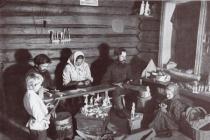SOCIAL SERVICE ORGANIZATIONS- organizations providing social services at home, semi-stationary social services, stationary social services (Article 23 of the Federal Law of December 28, 2013 No. social service citizens in Russian Federation”).
O.s.o. in the subjects of the Russian Federation are created and act taking into account guidelines according to the calculation of the needs of the constituent entities of the Russian Federation in the development of the O.s.o. and in accordance with the rules for organizing the activities of O.s.o., their structural divisions.
The social service system includes:
- - O.s.o., administered by federal authorities executive power;
- - O.s.o., which are under the jurisdiction of the subject of the Russian Federation;
- - non-state (commercial and non-commercial) O.s.o., including socially oriented non-governmental commercial organizations providing social services;
- - individual entrepreneurs providing social services.
State (municipal) O.s.o. created in the form of institutions. Federal Law No. 83-FZ 83 of May 8, 2010 “On Amendments to Certain Legislative Acts of the Russian Federation in Connection with the Improvement of the Legal Status of State (Municipal) Institutions” defines three types of state (municipal) institutions: state, budgetary and autonomous. All three types of institutions are state or municipal and differ in the degree of financial and economic independence and independence from the state.
A budgetary institution is a non-profit organization established by the Russian Federation, a constituent entity of the Russian Federation or a municipality to perform work, provide services in order to ensure the implementation of the powers of the relevant bodies provided for by the legislation of the Russian Federation. state power(government bodies) or bodies local government in the fields of science, education, healthcare, culture, social protection, employment, physical culture and sports, as well as in other areas.
The decision to create a budgetary or state-owned institution is made in the manner prescribed by:
- 1) the Government of the Russian Federation - for federal budgetary or state institutions;
- 2) the highest executive body of state power of a constituent entity of the Russian Federation - for budgetary or state institutions of the constituent entities of the Russian Federation;
- 3) by the local administration of the municipal formation - for municipal budgetary or state-owned institutions.
The founder of a budget or government institution is:
- 1) the Russian Federation - in relation to a federal budgetary or state institution;
- 2) a constituent entity of the Russian Federation - in relation to a budgetary or government institution of a constituent entity of the Russian Federation;
- 3) a municipal formation - in relation to a municipal budgetary or state-owned institution.
The decision to create a non-governmental organization as a result of its establishment is taken by its founders (founder).
A budgetary institution carries out its activities in accordance with the subject and goals of activities determined in accordance with federal laws, other regulatory legal acts, municipal legal acts and charter. An exhaustive list of activities that budgetary and state-owned institutions can carry out in accordance with the goals of their creation is determined by the constituent documents of institutions.
A non-governmental organization may carry out one type of activity or several types of activity not prohibited by the legislation of the Russian Federation and corresponding to the goals of the organization's activities, which are provided for by its constituent documents.
The legislation of the Russian Federation may establish restrictions on the types of activities that non-profit organizations of certain types are entitled to engage in, and in terms of institutions, including certain types.
Separate types activities can be carried out by organizations only on the basis of special permits (licenses). The list of these activities is determined by law.
A budgetary institution has the right, in addition to the established state task, to perform work, provide services related to its main activity, provided for by the constituent document, to citizens and legal entities for a fee, as well as conduct other types of activities that are not the main ones, only insofar as it serves to achieve the goals for which it was created.
State institutions can carry out income-generating activities, but the income they receive from this activity goes to the appropriate budget of the budget system.
Financial support for the activities of social service organizations that are under the jurisdiction of federal executive bodies is carried out in accordance with the budgetary legislation of the Russian Federation at the expense of federal budget, as well as at the expense of the recipients social services when providing social services for a fee or partial payment.
Financial support for the activities of O.s.o. of the constituent entity of the Russian Federation is carried out in accordance with the budgetary legislation of the Russian Federation at the expense of the budget of the constituent entity of the Russian Federation, as well as at the expense of the recipients of social services when providing social services for a fee or partial payment.
Financial support for the provision of social services non-governmental organizations, individual entrepreneurs carrying out social service activities and providing social services by socially oriented non-profit organizations is carried out by providing subsidies from the relevant budget of the budget system of the Russian Federation in accordance with the budgetary legislation of the Russian Federation, conducting purchases of social services in accordance with the legislation of the Russian Federation on contract system in the field of procurement of goods, works, services to meet state and municipal needs, as well as at the expense of recipients of social services when providing social services for a fee or partial payment.
The property of a budgetary institution is assigned to it on the basis of the right of operational management in accordance with Civil Code RF. The owner of the property of a budgetary institution is the Russian Federation, a subject of the Russian Federation, a municipality, respectively.
The land plot necessary for the fulfillment by a budgetary institution of its statutory tasks is provided to it on the basis of the right of permanent (unlimited) use.
Autonomous institution, in contrast to the state and budget institutions, has the right to open not only personal accounts in the territorial bodies of the Federal Treasury (financial authorities), but also accounts in credit organizations. In addition, institutions of this type are allowed to place funds on deposits in credit institutions and make transactions with securities.
A budgetary institution, like an autonomous institution, is liable for its obligations with property that is under its right of operational management (with the exception of immovable and especially valuable movable).
State institutions are liable for their obligations with the funds at their disposal. In case of insufficient funds, the owner of the property shall bear subsidiary liability for the obligations of state institutions.
In state O.s.o. boards of trustees are established. The structure, procedure for formation, term of office, competence of the board of trustees and the procedure for making decisions by it are determined by the charter of the O.s.o. in accordance with the legislation of the Russian Federation on the basis of an exemplary regulation on the board of trustees of a social service organization.
Coordination of activities and general methodological support of the independent evaluation the quality of services provided by organizations in the field of social services are carried out by the federal executive body, which performs the functions of developing and implementing public policy and regulatory legal regulation in the field of social protection of the population, in the manner established by the Government of the Russian Federation (Federal Law of July 21, 2014 No. 256-FZ).
N.N. Strelnikova, L.I. Kononova
Lit.: Federal Law No. 442-FZ of December 28, 2013 “On the Fundamentals of Social Services for Citizens in the Russian Federation”, Federal Law No. 83-FZ of May 8, 2010 “On Amendments to Certain Legislative Acts of the Russian Federation in Connection with the Improvement of the Legal Status of State (Municipal) ) institutions”; Federal Law No. 256-FZ of July 21, 2014 “On Amendments to Certain Legislative Acts of the Russian Federation on the Issues of Independent Assessment of the Quality of Services Provided by Organizations in the Sphere of Culture, Social Services, Health and Education”; Topchiy L.V. Organization of social services for the population. M., 2008; Office in social work: Textbook for bachelors / Ed. E.I. Kholostova, E.I. Komarova, O.G. Prokhorova. M.: ITK “Dashkov i K°”, 2014.
1. FEDERAL LAW ON THE BASIS OF SOCIAL SERVICE FOR THE POPULATION OF THE RUSSIAN FEDERATION
(as amended by the Federal Laws of July 10, 2002 N 87-FZ,
dated 25.07.2002 N 115-FZ, dated 10.01.2003 N 15-FZ, dated 22.08.2004 N 122-FZ)
This Federal Law in accordance with the Constitution of the Russian Federation, generally recognized principles and norms international law sets the foundations legal regulation in the field of social services for the population in the Russian Federation.
Chapter I. GENERAL PROVISIONS
Article 1. Social services
Social services are the activities of social services for social support, the provision of social, social, medical, psychological, pedagogical, social and legal services and material assistance, social adaptation and rehabilitation of citizens in difficult situations.
Article 2. Legislation of the Russian Federation on social services
The legislation of the Russian Federation on social services consists of this Federal Law, other federal laws and other regulatory legal acts of the Russian Federation, as well as laws and other regulatory legal acts of the constituent entities of the Russian Federation.
Article 3. Basic concepts
The following basic concepts are used in this Federal Law:
1) social services- enterprises and institutions, regardless of their form of ownership, providing social services, as well as citizens engaged in entrepreneurial activities for social services to the population without forming a legal entity;
2) a client of a social service - a citizen who is in a difficult life situation, who, in connection with this, is provided with social services;
3) social services - actions to provide certain categories citizens in accordance with the legislation of the Russian Federation, a client of the social assistance service provided for by this Federal Law;
4) difficult life situation - a situation that objectively disrupts the life of a citizen (disability, inability to self-service due to old age, illness, orphanhood, neglect, low income, unemployment, lack of a fixed place of residence, conflicts and abuse in the family, loneliness, etc. ), which he cannot overcome on his own.
Article 4 Social service systems
1. State system of social services - a system consisting of state enterprises and social service institutions that are the property of the constituent entities of the Russian Federation and are under the jurisdiction of state authorities of the constituent entities of the Russian Federation.
(as amended by Federal Law No. 122-FZ of 22.08.2004)
2. Social services are also provided by enterprises and institutions of other forms of ownership and citizens engaged in entrepreneurial activities for social services to the population without forming a legal entity.
3. The state supports and encourages the development of social services, regardless of the form of ownership.
2) Decree of the Government of St. Petersburg dated July 3, 2007 No. 732 “On the development plan for the system of social service institutions for the population of St. Petersburg in the territories of St. Petersburg districts for 2007-2010”.
For creating optimal system social service institutions approved the development plan for the system of social service institutions. In accordance with the Concept for the Development of the System of Social Protection of the Population of St. Petersburg for 2006-2010, in each district of the city, by the end of 2010, such a system of social services should be created that would fully satisfy the needs of all categories of citizens and meet modern requirements. The system includes three types of institutions: institutions for senior citizens; institutions for the disabled; institutions for families and children.
Federal Law No. 122-FZ of August 2, 1995 "On Social Services for Elderly Citizens and the Disabled"
Social services are provided through the system of social services.
The concept of "social service" refers to the basic concepts in social services for the population and is defined as a system of state and non-state structures that carry out social work and have in their composition special institutions for the provision of social services and their management bodies.
Social service as a tool of social work organizes its activities in two directions: social protection and social assistance. The implementation of activities is based on the following approaches:
assistance should be of a reintegrating nature;
when providing assistance, they carry out an individual approach to the client's request;
social assistance is provided on the basis of the principle of subsidiarity;
The beneficiary must be active;
mechanisms social assistance“turn on” when other ways of support (psychological, moral, contractual, legislative) have been exhausted.
The system of social services includes state, municipal and non-state services.
The state social service includes institutions and social service enterprises, executive authorities of the Russian Federation and constituent entities of the Russian Federation, whose competence includes the organization and implementation of social services.
The municipal social service includes institutions and social service enterprises, local self-service bodies, whose competence includes the organization and implementation of social services.
Non-state social service includes institutions and social service enterprises created by charitable, public, religious and other non-governmental organizations and individuals.
In the context of these approaches, a client who finds himself in a difficult life situation can receive the following support based on his requests (see table).
Client assistance system in the social service system
State social services are focused mainly on providing people in need with various kinds of services. This determines the totality and content of its functions, among which, according to the Concept for the Development of Social Services for the Population of the Russian Federation (1993), the following stand out:
a) social assistance function, which includes:
identification, registration of families and individuals those most in need of social support (low-income citizens, families with minor children and other disabled members), the provision of material (financial, in-kind) assistance and the provision of temporary housing to those in need, etc.;
poverty prevention: creation of conditions for families to independently ensure their well-being, family entrepreneurship;
home-based services for those in need of outside care (delivery of food, medicines, transportation for treatment, home health monitoring, etc.);
promoting the development of non-traditional forms of pre-school, school and out-of-school education;
organization of a temporary forced stay of a child outside the parental family, his further placement in a children's institution, under guardianship (guardianship), adoption;
b) a consulting function, which includes:
consultation of specialists (lawyers, sociologists, teachers, doctors, psychologists, etc.);
participation in the preparation of young people for the choice of a profession;
preparation of boys and girls for marriage and conscious parenthood;
parental medical and psychological general education;
c) the function of social adjustment and rehabilitation, which includes:
social medical and psychological rehabilitation of minors with deviant behavior, neglected children and adolescents, children left without parental care;
medical and social rehabilitation and rehabilitation of children and adolescents with disabilities and families raising them;
d) the function of information of the population, the study and forecasting of social needs, within which three areas are distinguished:
providing the client with the information necessary to resolve a difficult life situation;
dissemination of medical, psychological, pedagogical and other knowledge among the population;
study by social workers, specially created institutions, and with the help of scientific organizations of the needs of their clients and social problems that give rise to crisis situations in the region, the development and implementation of specific measures aimed at their elimination;
e) the function of participation in the implementation of emergency measures to overcome the consequences of natural disasters and social conflicts. In this regard, it is envisaged:
participation of social service specialists in the development of emergency programs;
formation within the framework of rescue services organized at the central and other levels, teams of social workers, etc.
The main areas of social services for the population are defined by the Federal Law "On the Fundamentals of Social Services for the Population in the Russian Federation" (1995):
providing material assistance to citizens in difficult life situations, in the form of Money, food products, as well as special vehicles, technical means rehabilitation of the disabled and persons in need of outside care, etc.;
social services at home, which is carried out by providing social services to citizens in need of permanent or temporary non-stationary social services;
social services in stationary institutions, carried out by providing social services to citizens who have partially or completely lost the ability to self-service and in need of constant outside care, and ensuring the creation of living conditions appropriate to their age and state of health, medical, psychological, social measures, nutrition , care, as well as the organization of feasible labor activity, recreation and leisure;
Provision of temporary shelter in specialized institutions of social services to orphans, neglected minors, citizens who find themselves in a difficult life situation, citizens without a fixed place of residence, victims of mental or physical violence and other clients of the social service who need temporary shelter;
Organization of a day stay in social service institutions with the provision of social, social, medical and other services to those who have retained the ability to self-service and active movement to elderly citizens and the disabled, as well as to other persons, including minors, who are in a difficult life situation;
· advisory assistance on issues of social and social and medical life support, psychological and pedagogical assistance, social and legal protection;
· rehabilitation services for persons with disabilities, juvenile delinquents, other citizens who find themselves in a difficult life situation and need professional, psychological, social rehabilitation.
Social services are based on the principles: equal opportunities citizens regardless of nationality, gender and age; availability; voluntariness; promotion of self-reliant social adaptation; targeting; priority of assistance to citizens who are in a dangerous or helpless state; humanity, benevolence, respect for confidentiality; preventive orientation; legitimacy and respect for international standards.
Social service is formed on the basis of legality, humanism, justice and democracy. At the same time, common principles for the entire system of social service are common principles, the widespread adherence to which makes this system integral and consistent:
Priority principle state principles in organizing social services and guaranteeing the rights of citizens to receive social services and assistance in difficult life situations means that the state ensures the rights of the individual, sovereignty, honor and freedom, protects it from all sorts of encroachments. It provides a social service system necessary materials, finance, human resources, determines the responsibilities of institutions, governments and social workers.
The principle of reliance on public participation means that the public component is a necessary link in the work of social services and their management. At the same time, in cases where the activities of social services require social professional training, public participation is possible only as an assistance to the main subjects of this activity.
The principle of territoriality means that the social service is as close as possible to the population and, therefore, as accessible as possible for direct use. This principle makes it possible to solve the problems of integrating departmental interests and opportunities for a comprehensive solution of social service problems, to maintain a variety of activities with common goals.
The principle of awareness means that institutions and management bodies of the social service have the right to collect information, receive, upon a reasoned request from state and public bodies, information that is necessary for their functions and assistance to clients.
The functions of managing the issues of social services for the population in the jurisdictional territory are carried out by the bodies of social protection of the population. They build their activities in cooperation with health authorities, public education, culture, physical culture and sports, law enforcement agencies, state services for youth and employment and other government bodies, as well as with public, religious, charitable organizations and funds.
3. Institutions of social services for the population: their types and specifics of activities
The system of social services includes a network of specialized institutions designed to serve the relevant groups of the population.
An important place in this system belongs to the territorial centers of social services for the population. Territorial social service is a set of governing bodies and specialized institutions that provide direct social services to various groups and categories of the population on the territory of various administrative units of the Russian Federation: in regions, urban and rural areas, microdistricts, etc.
The functions of managing social services for the population in the jurisdictional territory are carried out by the bodies of social protection of the population. Local authorities (as well as non-state, public, private and other organizations with a license) create specialized social service institutions, the leading place among which is given to territorial social service centers. In accordance with the approximate Regulations on the Center for Social Services (order of the Ministry of Social Protection of Russia No. 137 of 07/20/1993). Social Service Center is an institution of social protection of the population, carrying out organizational and practical activities on the territory of a city or district to provide various types of social assistance to the elderly, the disabled and other groups of the population in need of social support. Social service centers may have in their structure various divisions social services, including day care units for the elderly and disabled, social assistance at home, urgent social assistance services, as well as others created taking into account the need and available opportunities. These centers provide comprehensive social assistance different types: psychological, legal, rehabilitation, socio-pedagogical, medical and social, preventive, etc.
The territorial service may also include functional specialized centers, institutions and social service enterprises, regardless of ownership. Services can be state, municipal, non-state.
State social service(federal bodies and institutions, social service enterprises; social service units of the constituent entities of the Russian Federation).
Municipal social service(local authorities
departments responsible for social services; institutions and social service enterprises of municipal subordination).
Non-state social service ( institutions and social service enterprises of public, charitable, religious and other non-governmental organizations).
Today, one can observe how the network of institutions and social service enterprises is constantly developing, new types of them are emerging, which makes it possible to cover an ever wider range of social problems of various strata and groups of the population. The social service system is still in the process of formation. Financing of social service institutions is carried out, as a rule, on a budgetary basis. Thus, the financial resources of the social service are formed from:
Ø normative deductions from the budgets of the respective
level in the amount of at least 2% of the expenditure part of the budget;
Ø proceeds from the fund social support the population by allocating part of the funds for the purpose of social support for families with children;
Ø funds from the federal budget for the implementation of statutory tasks;
Ø finances as a result of the reallocation of funds between committees and departments of services different levels for the implementation of regional, city and district programs;
Ø additional funds from the regional and local budgets to provide targeted measures to adapt the income of the population to the increase in the cost of living, etc.;
Ø income from paid services and from the economic activities of institutions and enterprises of the service;
Ø charitable donations and contributions from businesses, public organizations and individuals, proceeds from charitable actions.
Funds of specialized centers are formed depending on the type of activity and the type of organization of their financing: budgetary, self-supporting or mixed. When the center organizes paid services to the population and makes a profit, it is directed to further development main activity of the center and is exempt from taxation in terms of funds credited to the local budget.
The main principle of the organization of social services in the Russian Federation is the territorial principle. At the same time, the social services of various ministries and departments are considered as integral components (or sectors) of territorial social services. Sometimes local social service institutions have dual administrative subordination and several sources of funding. At the same time, practice proves the need for the formation of a subsystem of social services within individual departments, for example, social protection of the population, education, the Ministry of Internal Affairs or the employment service, youth.
However, the development of a network of social service institutions is constrained today by the following factors:
ü weak legal base of the system of social services;
ü limitation financial resources available at the disposal of federal and regional governments, as well as local governments;
ü lack of coordination in the activities of ministries and departments in the field of social services;
ü shortage of personnel with professional training in the field of social work;
ü low social status and inadequate wages of social workers;
ü insufficient use of financial, economic and intellectual potential of non-governmental institutions.
Social service institutions for families and children
An important aspect in the regulation of socio-economic processes in society is the protection and support of the institution of the family. The basic principles in the organization of social assistance to the family by state, municipal and public organizations can be expressed as follows:
Empowerment of the family to solve vital tasks;
Establishing a family connection with other teams, organizations and social institutions that provide resources, support opportunities;
Promoting the effective and humane operation of the family as a socio-economic system;
Development of self-help to improve family social policy in the territories.
The general functional scheme can be represented as a system of interaction between the family and state, public, confessional and private structures.
Plans for the development of social service institutions for families and children are, as a rule, linked to the tasks of implementing regional family policy programs. Currently, horizontal structures of the system of social assistance to the family are being created at all levels, taking into account the specifics of the regions. So, at the district (city) level, the organizers of social services serving families should know the needs of the population for such services. For these purposes, it is necessary to take into account the types of families, the presence of acute problems, the attitude of the population towards such a service; in cases of need to form public opinion about the creation of an appropriate service and the possibility of applying to it by any resident of the region. The practice of developing family social assistance services in Russia shows that in a district (microdistrict) it is necessary to provide for the provision of a range of social services to both children and parents.
Regional institutions are also called upon to perform scientific and methodological functions: for example, a comprehensive regional center for social assistance to families and children or a regional center for social health of the population should, based on the local situation, come up with recommendations to power structures. Such regional institutions as the "Trust" service, etc., also seem to be quite promising.
Social assistance service should be organized as open system in accordance with the social situation of a particular territory, where individual institutions and service units act as structures of elements created as needed.
public service assistance to families and children performs following features:
analytical: studies the problems and needs of his contingent of families or members of the team;
planning and organizational: plans and organizes social services in society;
managerial: provides contact with state bodies on which the solution of client problems depends, achieves a solution, evaluates the result of a particular event, etc .;
informational: informs the population about the possibilities of service, new state decisions on social protection of the population.
Social work in these services can be expressed in various ways. family assistance. So, for example, emergency care for acute mental conditions of a person caused by social conditions or a difficult life situation is aimed at removing or reducing the negative, including even the possibility of suicide, the consequences of such a state. This assistance can be provided by such institutions and divisions of the service as helplines, emergency psychological help and etc.
Assistance can be of a long-term nature, when, in difficult life situations, the client is provided not only with primary, but also with in-depth long-term support aimed at improving the attitude towards the situation, identifying the client’s internal reserves and increasing his faith in himself and the ability to overcome the circumstances. Such assistance is provided in territorial centers for social assistance to families, social shelters for children and adolescents (mothers with children), rehabilitation centers, centers for helping children left without parents, in psychological and pedagogical consultations, territorial teams of social workers, which include social workers specializing in various types of family problems, which makes it possible to jointly search for solutions in the most difficult situations.
Help can be direct or indirect. Direct assistance is aimed directly at protecting the rights and interests of the client, improving his living conditions, removing unwanted mental states, etc. Indirect assistance is provided through work with the client's social environment (family, members of the work team, friends, street company, etc.), through various state organizations and funds.
In addition, assistance can be direct in another sense of the word, namely, in response to the current situation or the client's request, as well as preventive in nature, i.e., warning a predictable unfavorable situation.
In accordance with the order of the Ministry of Social Protection of Russia No. 47 dated April 14, 1994, the Approximate Regulations on the Territorial Center for Social Assistance to Families and Children were approved, which defined it as an institution state system social protection of the population intended for comprehensive service on the territory of the city, district or microdistrict of families and children in need of social support, by providing timely and qualified social assistance of various types.
The center may have in its structure various departments of social services for families and children, including departments for primary admission, information, analysis and forecasting, socio-economic assistance, medical and social assistance, psychological and pedagogical assistance, prevention of neglect of children and adolescents, etc. d.
The purpose of the Center is to promote the realization of the right of families and children to protection and assistance from the state, to promote the development and strengthening of the family as a social institution, to improve socio-economic living conditions, indicators of social health and well-being of the family and children, to humanize family ties with society and the state and the establishment of harmonious intra-family relations.
The main tasks of the Center are:
ü identification of the causes of social disadvantage of specific families and children, their need for social assistance;
ü determination and provision of specific types and forms of socio-economic, medical-social, psychological-social, socio-pedagogical, legal and other social services to families and children in need of social assistance;
support for families and individual citizens in solving the problems of their self-sufficiency, realizing their own capabilities to overcome difficult life situations;
ü social patronage of families and individuals in need of social assistance, rehabilitation and support;
ü participation in the prevention of neglect of minors, protection of their rights;
ü analysis of the level of social services for families with children in the city, district, microdistrict, forecasting their need for social assistance and preparing proposals for the development of social services;
ü involvement of various state and non-governmental organizations in solving issues of social services for families and children.
Families: incomplete, large families, low-income families, etc.;
Children and adolescents in unfavorable family conditions that threaten their health and development; orphaned or left without parental care; having deviations in physical and mental development, incl. disabled people, etc.;
Adult citizens (pregnant women and nursing mothers; having dependent minor children, etc.);
Former pupils of orphanages and boarding schools.
Today, about 1,500 institutions for families and children operate in the system of social protection bodies, of which about 200 are centers for social assistance to families and children.
Social service institutions for pensioners
In accordance with the Constitution of the Russian Federation, citizens of Russia have the right to social security, including pensions, in old age.
A pension is a cash benefit received by citizens from public funds consumption due to old age, in case of disability, for length of service, in the event of the loss of a breadwinner, which is the basis for calculating a pension. Payments are made monthly in connection with the achievement of retirement age.
In accordance with the legislation, pensions are divided into state and non-state. The law establishes labor and social pensions. In connection with labor and other socially useful activities, pensions are assigned: for old age (by age), for disability, for the loss of a breadwinner, for long service. Citizens who for some reason do not have the right to a pension in connection with labor and other socially useful activities are provided with a social pension.
The pension is assigned for life. Pension provision in accordance with the current legislation is carried out by state social security bodies.
Men are entitled to an old-age pension upon reaching the age of 60 with at least 25 years of work experience, women - upon reaching 55 years of age with at least 20 years of work experience. Pensions are granted to certain categories of citizens on preferential terms (that is, at a lower age and length of service).
Pension legislation ensures the right of citizens to choose one of the types of state pension. An exception is established only for persons who became disabled as a result of a military injury, who can receive two types of state pension at the same time: old age (or for length of service) and disability pension.
Great importance in modern conditions acquire institutions of social service for pensioners, interdepartmental work on the organization of social support for the elderly. This is due to an increase specific gravity elderly people in the composition of the population, a change in the social status of a person in old age, the termination or restriction of labor activity, the transformation of value orientations, the very way of life and communication, as well as the emergence of various difficulties, both in social and psychological adaptation to new conditions. All this dictates the need to develop and implement specific approaches, forms and methods of social work with pensioners and the elderly. Social services for the elderly are carried out in accordance with ethical principles of the International Labor Organization:
personal dignity− the right to decent treatment, treatment, social assistance and support;
freedom of choice- every elderly person has the right to choose between home care and shelter, temporary or permanent;
aid coordination− assistance provided by various social bodies should be active, coordinated and consistent;
care personalization- assistance is provided, first of all, to the elderly citizen himself, taking into account his environment;
bridging the gap between health and social care- with the priority nature of the criterion of health status, the level financial assistance cannot depend on the standard of living and place of residence.
The legal framework for social work with the elderly in the Russian Federation is The federal law“On the basics of social services for the population in the Russian Federation” (dated 10.12.1995). In accordance with this law, the scope of social services provided to the elderly includes: social, social, medical, psychological, pedagogical, social and legal services; financial assistance and social adaptation and rehabilitation of the elderly.
At the initial stages of development of the social assistance system for the elderly, such urgent problems as catering, medical services, housing, material support in order to create normal living conditions for them.
At the present stage, the organization of assistance to the elderly, along with the solution of these traditional social problems, involves the development social technologies, the introduction of which will contribute to solving issues related to psychological difficulties that arise in the elderly in the process of communication or from loneliness. It is also necessary to take into account how older people will perceive other age groups, what are the social problems of those who live to old age, their relationships with other people, the role and status of older people in the family and society, etc. It should be noted that there are different categories of older people. Among them are people:
Not in need of help;
Partially disabled;
in need of service;
Requiring constant care, etc.
As a rule, programs of social assistance, rehabilitation, correction are developed depending on belonging to one or another category of older people. The use of various principles, methods, and techniques of working with a client is also connected with this.
The main principles of working with the elderly are respect for and interest in the personality of the client, emphasis on the relevance and usefulness of his experience and knowledge to people around him. It is important to perceive an elderly person not only as an object, but also as a subject of social work. This should help to find and develop their internal reserves that contribute to self-realization, self-support and self-defense. An important role is played by the professional competence of the social worker, which includes knowledge of the gerontological and psychological characteristics of age, taking into account the client's belonging to a particular social group.
Assistance to the elderly is carried out by the bodies of social protection of the population through their branches, which identify and keep records, carry out different kinds social support, offer and provide paid services. Social services are carried out by decision of the bodies of social protection of the population in institutions subordinate to them or under agreements concluded by the bodies of social protection with a social service institution of other forms of ownership.
The following institutions also perform the function of social protection and assistance:
ü boarding houses;
ü departments of day and night stay;
ü special homes for single elderly;
ü hospitals and departments for chronic patients;
ü hospitals various types;
ü territorial centers of social services;
ü departments of social assistance at home;
ü gerontological centers, etc.
In the system of stationary institutions of the Russian Federation, a relatively new element is special houses for permanent residence single elderly people and married couples who have retained full or partial ability to self-service in everyday life and need appropriate conditions for self-realization of basic life needs.
Model Regulations on a special home for such pensioners (dated April 7, 1994) lists its functions:
Ø Providing favorable conditions for living and
self-service;
Ø providing residents of the elderly
permanent social and medical assistance;
Ø creation of conditions for maintaining an active lifestyle, including feasible labor activity.
Architectural and planning solutions for a special house must comply with age characteristics living population of citizens. Such a house consists of one-two-room apartments, includes a complex of social services: medical office, a library and a room for club work, a dining room (buffet), points for ordering food products, putting things in a laundry and dry cleaning, as well as premises for work, etc.
The special home is equipped with small-scale mechanization facilities that facilitate the self-service of the elderly citizens living in it. It should operate around the clock control room, provided with internal communication with all residential premises and external telephone communication.
Medical care for citizens is carried out by medical personnel of territorial medical and preventive institutions.
Based on the current legislation, citizens living in such houses are paid a full pension. They have the right to priority referral to stationary institutions of the social protection authorities.
The organization of special homes for single elderly and elderly couples is one of the promising ways to solve a whole range of social problems of pensioners and elderly citizens.
The foundations of the system of social services for various categories of the population in our country are laid down in a number of laws, federal and regional programs. First of all, in the law “On the Fundamentals of Social Services for the Population of the Russian Federation” (1995) and the law “On Social Services for Elderly Citizens and the Disabled” (1995), in the federal programs “Children of Russia”, “Children with Disabilities”, “Development of Social services for families and children” and others.
Now it can already be stated that new professions have also established themselves in our country - social work and social pedagogy, and new system social service institutions. The main place among social service institutions is occupied by institutions of the system of the Ministry of Health and social development RF:
Family social service institutions;
Institutions of social service for the elderly and disabled;
Departments of social assistance at home;
Services of urgent social assistance;
Territorial social centers.
Among these institutions, in terms of their significance (not in quantity), territorial social centers come first as comprehensive institutions for providing assistance to those in need (primarily pensioners, the disabled, and low-income families). Moreover, there is a trend that is expressed in the desire of each primary territorial-administrative unit (district, small town) to have its own social service center.
The real number of such centers depends, first of all, on the material and financial capabilities of local authorities. A feature of the territorial centers of social services is that, by the nature of their activities, they are institutions of a complex type, they can organize various kinds of services and departments that perform specific functions. Yes, according to exemplary position on the center of social services, approved by the Ministry of Social Protection of Russia (1993), the following departments and services can be opened in the center of social services:
Day care department (created to serve at least 30 people);
Department of social assistance at home (created to serve at least 60 pensioners and disabled people living in countryside, and at least 120 pensioners and disabled people - in urban areas);
Emergency social assistance service (designed to provide emergency assistance of a one-time nature).
In the day care department, the following positions are provided: head of the department, nurse, cultural organizer (with the duties of a librarian), instructor in occupational therapy(if there are workshops or subsidiary farm), housewives, barmaid and others.
In the department of social assistance at home - the head of the department, Social worker(social work specialist) - 1.0 rate for 8 people served in urban areas and 1.0 for 4 people. - in rural areas, the driver of the car (if there is a vehicle).
In the emergency social assistance service - the head of the service, a psychologist, a lawyer, a social work specialist (2 units), a social worker (1 unit), a car driver (if there is a vehicle).
Of course, specialized departments or services can also be created, in addition to social service centers, directly by social protection authorities. Many of these services or departments were opened even before the territorial centers of social services began to function in a particular locality.
Along with social service institutions of the system of the Ministry of Health and Social Development, there are institutions of other departments (sectoral, trade union, youth, etc.). For example, in every region of Russia there are social youth services.
Various kinds of specialized (non-commercial) social service centers are organized on the territory of local authorities. These may also be centers for the provision of social and legal services for employment (founders: municipal (territorial) body and several commercial organizations), and rehabilitation centers for the disabled and orphans (founders: territorial body, Committee for Family and Youth Affairs, public and commercial organizations), etc.
It should be emphasized that the permission to conduct social protection activities on their territory by various departments and commercial structures are provided by the relevant bodies of social protection and local self-government. At the same time, the municipality entity, which gives permission for social protection activities on its territory, can act in several persons: and as one of the co-founders of a social institution organized on the initiative of various departments and public associations, and as the initiator and coordinator of the majority of socio-cultural events in the territory under his jurisdiction.














